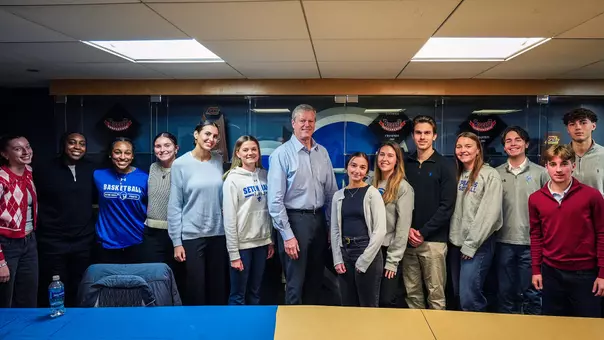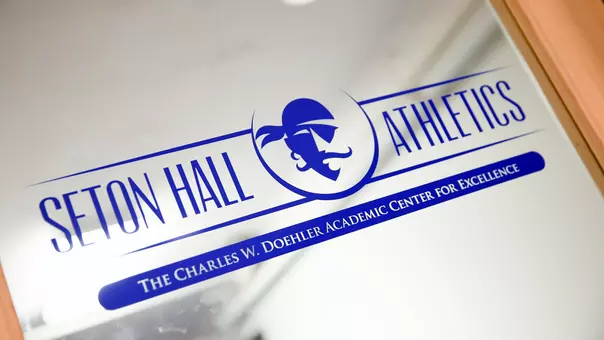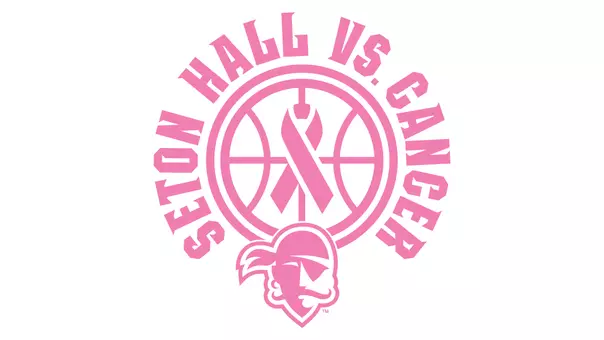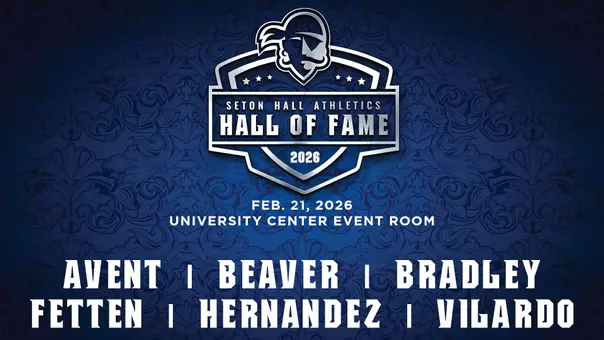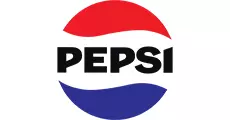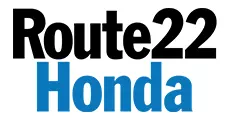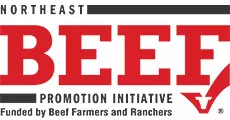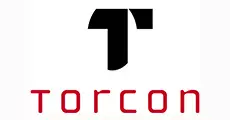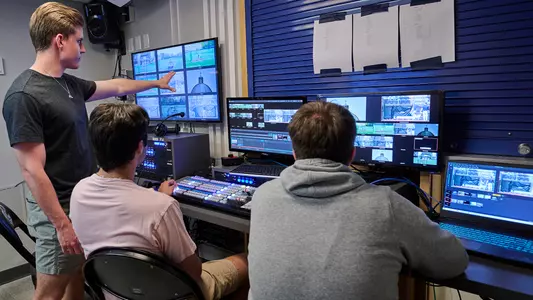
A Look Inside Seton Hall’s Award-Winning Sports Network
8/27/2024 4:30:00 PM | General
Written by Seton Hall student Zach Mawby '26
"Ready two, take two."
"Replay ready in A, three, two, one, take A."
"Roll Balzan starting pitcher graphic."
These are some of the sounds in the Pirate Sports Network (PSN) control room on Saturday, May 11 during the broadcast of the baseball team's doubleheader against St. John's. And they are the sounds of communication among Seton Hall students working as a team to produce a quality stream that airs on FloSports.
Almost entirely student-run, PSN members receive experiential learning, the opportunity to learn while doing, giving them hands-on experience in all facets of live sports production. The PSN consists of approximately 30 Seton Hall students, who sign up to participate in live broadcasts around their academic and social calendars.
Leading up to this May doubleheader, PSN signups were abundant, giving PSN executive producer Thomas Chen, who also serves as a senior associate athletics director within the athletics department, the idea for a "mega-broadcast," or "megacast" for short. The additional members allowed the network to do things they would not normally be able to do, including a second graphics operator; two additional camera operators; a video clipper for live out-of-town score updates and a scroll operator. These additions to the team would contribute to a thorough broadcast with more room for creativity. This, along with the natural excitement that comes with the end of the semester, contributed to a special broadcast that featured the network at its full potential.
Including this megacast, the network remotely produces broadcasts from its state-of-the-art control room, located in the Richie Regan Recreation and Athletic Center on campus. In the control room, members work together while simultaneously having their own roles and responsibilities. For instance, the network's graphics operator is responsible for the creation of on-screen graphics, which typically include stats, facts, and insight about the teams. In addition, the network has camera operators who produce the visuals for the broadcast. By collaborating with the director, the camera operators alternate between different camera angles to create a captivating viewing experience for the audience. These camera operators also tend to compile footage before the broadcast for use during it.
In fact, a lot goes into the broadcast before it actually starts; this includes the introductory segment called the "open." For this segment, the producer of the broadcast communicates a plan for the opening shots of the broadcast. This communication extends to the network's on-air personalities as well. Once everyone is on the same page, the team records multiple takes and chooses the best one to use to begin the broadcast.
The emphasis on communication, collaboration, and teamwork is key to the success of a broadcast, according to the network's student leaders. This includes rising senior Jackson Shank '25, who was PSN's assistant director of broadcasting in 2023-24. For the network's megacast, he was responsible for managing the entire broadcast as the producer.
"I've learned how to work with a team," said Shank when asked what he has learned from his PSN experience. "As much as I worked with others when I played baseball in high school, teamwork is just as, if not more, important here. The way that we phrase it is that if I'm the producer, I'm the head coach in the ears of my 'quarterbacks,' who are my fellow broadcasters. So, communication is very important, as is teamwork."
"The biggest thing I learned from PSN is the importance of collaboration," said Ryan Johnston '24, PSN's co-director of broadcasting last season who recently graduated and is now a digital rotational associate at CNBC. "Working with a team and taking input from multiple sources is something that everyone needs to learn at some point in their career."
Johnston was the play-by-play commentator for megacast, and his on-air partner in the analyst position was Michael Stamm '24. Like Johnston, Stamm also recently earned his Seton Hall degree and now works with SNY as a production assistant for the network's coverage of the New York Mets. With PSN as the co-director of broadcasting in 2023-24, he was a producer and on-air talent whose value cannot be overstated by those at the helm of the network. "One of the biggest things I learned from PSN is the importance of communication and teamwork," said Stamm. "A broadcast cannot succeed unless everyone is on the same page."
Communication, collaboration, and teamwork are made easier by comradery. PSN members report that the network is a community above all. "There is a reason why I'm not involved in Greek life—PSN is my fraternity," said Shank when asked about what kind of relationship he has with other members of PSN. "I love the people that I work with, and we all enjoy hanging out together. We cover over eighty broadcasts together, so inside and outside of broadcasting, we're all really close."
When asked the same question, Stamm discusses his friendship with Johnston: "I feel like I've made lifelong friends through PSN—Ryan Johnston, for example," said Stamm. "Because he and I worked together all year long, we developed a close friendship, which is something that I'll never forget.
"PSN never felt like 'work' to me because of the people that I got to work with," Stamm added. "Instead, it felt like a big friend group, or even like a big family. We all got along really well, and we always had a good time."
Stamm also credits his time with PSN for bringing him closer to people with similar goals as him: "Because of PSN, I got close to a lot of talented and hard-working people who wanted to make it in the competitive world of sports broadcasting just like me."
This comradery also extends to the network's administrators, the members of Seton Hall's athletics communications department, who allow students to operate independently while they handle the logistical and business sides of things. They also serve as mentors to students who are willing to help whenever they are needed. Their trust and willingness to help have led to comradery between them and the students.
When asked about how the administrators have helped during his experience with PSN, Shank attributes the passion of the network directly to them: "Tom [Chen] works his tail off every day, so having him as a mentor is great because it makes me want to succeed that much more. Everyone in the athletics communications office who help us out by granting us access to coaches, players, etc., are great as well. These people are all so passionate about what they do, which inspires me and other student-members of the network to be just as passionate as they are."
In addition to their passion, both Stamm and Johnston express their appreciation for their honesty. "All of the athletics communications directors have been extremely helpful both on and off the air during my time with the network," said Johnston. "I would constantly go to them for feedback, and they were always very honest with me, which I greatly appreciated—their honesty has helped foster a strong relationship between me and everyone in the department."
"I would not be where I am without Tom, Peter [Long], Matt Sweeney, and Matt Ambrose," said Stamm, acknowledging the role they played in his growth and development. "They have all been so helpful ever since my first time covering games with PSN. One of the things I appreciated most about them is that they will tell you when you're wrong or where you've made a mistake." Stamm believes that their honesty and constructive criticism motivated him to work even harder during his time with the network.
In addition, both Stamm and Johnston agree that they were part of a welcoming environment: "I've never been afraid to share my thoughts with the administrators because I've never seen them as intimidating. They have always been extremely helpful, welcoming, and receptive," said Johnston.
"There have been plenty of times when [Ryan Johnston] and I had questions or suggestions, and we weren't scared to approach them because we knew that they would hear us out," said Stamm.
Stamm also expressed how these administrators created an environment in which students could be themselves: "Whenever we went into the athletics office, it never felt like a sacred place where we had to be nervous or formal. We would spend time with them, and they were always happy to discuss whatever we had in mind, whether related to the network or not."
Stamm directly attributes this to the success of the network, as their open-minded approach rewarded student effort outside of broadcasting. "No one wants to settle for the status quo, which is why PSN is an award-winning network and one of the best in the conference," said Stamm. "They were always open to new ideas from students like us and would implement our ideas where they saw fit."
The success of the network can also be attributed to the size of Seton Hall. Although one of the smallest schools in the BIG EAST Conference, PSN members feel that its size has been beneficial to the network. For instance, Stamm believes that Seton Hall's size helped him get closer to the athletes he and the network were covering: "Something beneficial about a small school like Seton Hall is that we were able to become friends with a lot of the athletes. This is something that bigger schools may struggle with because there is more of a disconnect between the students and student-athletes."
Johnston adds that the size of the university allowed him to get hands-on experience early in his college career: "Because there aren't quite as many organizations like PSN at Seton Hall as there would be at a bigger school, I didn't have to wait a few years to get hands-on experience," said Johnston. "That was definitely something that drew me to Seton Hall, especially when I was looking at colleges."
And as students continue to look for the right University fit, Seton Hall's PSN stands out in the sports media world. The network has been named a finalist for a Sports Video College Sports Media Award seven times, including a 2024 nomination for its recap of the men's basketball team's NIT championship. It produced 84 broadcasts during the 2023-24 season, including numerous professional level broadcasts for the BIG EAST Digital Network, garnering PSN a reputation of one of the best student-run networks, not only in the conference, but also in the tri-state area.
Although it was broadcast 84 on the year, the megacast was one of the network's best. Even with summer break right around the corner, members of the network were as driven, focused, and passionate as ever. In addition, the network exhibited the qualities of a successful broadcast, including constant communication, collaboration, and high team morale.
"You have nothing to lose by giving it a try," said Johnston, offering his advice to those interested in sports media. "And if you do like it, stick with it. There have been times when people try broadcasting and it's not for them, which is completely understandable. But if it is for you and it is something that you are truly passionate about, sticking with it can lead to great opportunities. Speaking from my own experience, I got to go to MSG (Madison Square Garden) this year and help out with the BIG EAST Tournament because I stuck with it. Opportunities like that do come for those that stick with it and consistently put in the work."
"This is the closest thing that you can do to being in the (sports media) field without actually being hired," said Shank, offering the biggest selling point for joining the network. "So, get involved! We're always looking for new people to join PSN."
"Ready two, take two."
"Replay ready in A, three, two, one, take A."
"Roll Balzan starting pitcher graphic."
These are some of the sounds in the Pirate Sports Network (PSN) control room on Saturday, May 11 during the broadcast of the baseball team's doubleheader against St. John's. And they are the sounds of communication among Seton Hall students working as a team to produce a quality stream that airs on FloSports.
Almost entirely student-run, PSN members receive experiential learning, the opportunity to learn while doing, giving them hands-on experience in all facets of live sports production. The PSN consists of approximately 30 Seton Hall students, who sign up to participate in live broadcasts around their academic and social calendars.
Leading up to this May doubleheader, PSN signups were abundant, giving PSN executive producer Thomas Chen, who also serves as a senior associate athletics director within the athletics department, the idea for a "mega-broadcast," or "megacast" for short. The additional members allowed the network to do things they would not normally be able to do, including a second graphics operator; two additional camera operators; a video clipper for live out-of-town score updates and a scroll operator. These additions to the team would contribute to a thorough broadcast with more room for creativity. This, along with the natural excitement that comes with the end of the semester, contributed to a special broadcast that featured the network at its full potential.
Including this megacast, the network remotely produces broadcasts from its state-of-the-art control room, located in the Richie Regan Recreation and Athletic Center on campus. In the control room, members work together while simultaneously having their own roles and responsibilities. For instance, the network's graphics operator is responsible for the creation of on-screen graphics, which typically include stats, facts, and insight about the teams. In addition, the network has camera operators who produce the visuals for the broadcast. By collaborating with the director, the camera operators alternate between different camera angles to create a captivating viewing experience for the audience. These camera operators also tend to compile footage before the broadcast for use during it.
In fact, a lot goes into the broadcast before it actually starts; this includes the introductory segment called the "open." For this segment, the producer of the broadcast communicates a plan for the opening shots of the broadcast. This communication extends to the network's on-air personalities as well. Once everyone is on the same page, the team records multiple takes and chooses the best one to use to begin the broadcast.
The emphasis on communication, collaboration, and teamwork is key to the success of a broadcast, according to the network's student leaders. This includes rising senior Jackson Shank '25, who was PSN's assistant director of broadcasting in 2023-24. For the network's megacast, he was responsible for managing the entire broadcast as the producer.
"I've learned how to work with a team," said Shank when asked what he has learned from his PSN experience. "As much as I worked with others when I played baseball in high school, teamwork is just as, if not more, important here. The way that we phrase it is that if I'm the producer, I'm the head coach in the ears of my 'quarterbacks,' who are my fellow broadcasters. So, communication is very important, as is teamwork."
"The biggest thing I learned from PSN is the importance of collaboration," said Ryan Johnston '24, PSN's co-director of broadcasting last season who recently graduated and is now a digital rotational associate at CNBC. "Working with a team and taking input from multiple sources is something that everyone needs to learn at some point in their career."
Johnston was the play-by-play commentator for megacast, and his on-air partner in the analyst position was Michael Stamm '24. Like Johnston, Stamm also recently earned his Seton Hall degree and now works with SNY as a production assistant for the network's coverage of the New York Mets. With PSN as the co-director of broadcasting in 2023-24, he was a producer and on-air talent whose value cannot be overstated by those at the helm of the network. "One of the biggest things I learned from PSN is the importance of communication and teamwork," said Stamm. "A broadcast cannot succeed unless everyone is on the same page."
Communication, collaboration, and teamwork are made easier by comradery. PSN members report that the network is a community above all. "There is a reason why I'm not involved in Greek life—PSN is my fraternity," said Shank when asked about what kind of relationship he has with other members of PSN. "I love the people that I work with, and we all enjoy hanging out together. We cover over eighty broadcasts together, so inside and outside of broadcasting, we're all really close."
When asked the same question, Stamm discusses his friendship with Johnston: "I feel like I've made lifelong friends through PSN—Ryan Johnston, for example," said Stamm. "Because he and I worked together all year long, we developed a close friendship, which is something that I'll never forget.
"PSN never felt like 'work' to me because of the people that I got to work with," Stamm added. "Instead, it felt like a big friend group, or even like a big family. We all got along really well, and we always had a good time."
Stamm also credits his time with PSN for bringing him closer to people with similar goals as him: "Because of PSN, I got close to a lot of talented and hard-working people who wanted to make it in the competitive world of sports broadcasting just like me."
This comradery also extends to the network's administrators, the members of Seton Hall's athletics communications department, who allow students to operate independently while they handle the logistical and business sides of things. They also serve as mentors to students who are willing to help whenever they are needed. Their trust and willingness to help have led to comradery between them and the students.
When asked about how the administrators have helped during his experience with PSN, Shank attributes the passion of the network directly to them: "Tom [Chen] works his tail off every day, so having him as a mentor is great because it makes me want to succeed that much more. Everyone in the athletics communications office who help us out by granting us access to coaches, players, etc., are great as well. These people are all so passionate about what they do, which inspires me and other student-members of the network to be just as passionate as they are."
In addition to their passion, both Stamm and Johnston express their appreciation for their honesty. "All of the athletics communications directors have been extremely helpful both on and off the air during my time with the network," said Johnston. "I would constantly go to them for feedback, and they were always very honest with me, which I greatly appreciated—their honesty has helped foster a strong relationship between me and everyone in the department."
"I would not be where I am without Tom, Peter [Long], Matt Sweeney, and Matt Ambrose," said Stamm, acknowledging the role they played in his growth and development. "They have all been so helpful ever since my first time covering games with PSN. One of the things I appreciated most about them is that they will tell you when you're wrong or where you've made a mistake." Stamm believes that their honesty and constructive criticism motivated him to work even harder during his time with the network.
In addition, both Stamm and Johnston agree that they were part of a welcoming environment: "I've never been afraid to share my thoughts with the administrators because I've never seen them as intimidating. They have always been extremely helpful, welcoming, and receptive," said Johnston.
"There have been plenty of times when [Ryan Johnston] and I had questions or suggestions, and we weren't scared to approach them because we knew that they would hear us out," said Stamm.
Stamm also expressed how these administrators created an environment in which students could be themselves: "Whenever we went into the athletics office, it never felt like a sacred place where we had to be nervous or formal. We would spend time with them, and they were always happy to discuss whatever we had in mind, whether related to the network or not."
Stamm directly attributes this to the success of the network, as their open-minded approach rewarded student effort outside of broadcasting. "No one wants to settle for the status quo, which is why PSN is an award-winning network and one of the best in the conference," said Stamm. "They were always open to new ideas from students like us and would implement our ideas where they saw fit."
The success of the network can also be attributed to the size of Seton Hall. Although one of the smallest schools in the BIG EAST Conference, PSN members feel that its size has been beneficial to the network. For instance, Stamm believes that Seton Hall's size helped him get closer to the athletes he and the network were covering: "Something beneficial about a small school like Seton Hall is that we were able to become friends with a lot of the athletes. This is something that bigger schools may struggle with because there is more of a disconnect between the students and student-athletes."
Johnston adds that the size of the university allowed him to get hands-on experience early in his college career: "Because there aren't quite as many organizations like PSN at Seton Hall as there would be at a bigger school, I didn't have to wait a few years to get hands-on experience," said Johnston. "That was definitely something that drew me to Seton Hall, especially when I was looking at colleges."
And as students continue to look for the right University fit, Seton Hall's PSN stands out in the sports media world. The network has been named a finalist for a Sports Video College Sports Media Award seven times, including a 2024 nomination for its recap of the men's basketball team's NIT championship. It produced 84 broadcasts during the 2023-24 season, including numerous professional level broadcasts for the BIG EAST Digital Network, garnering PSN a reputation of one of the best student-run networks, not only in the conference, but also in the tri-state area.
Although it was broadcast 84 on the year, the megacast was one of the network's best. Even with summer break right around the corner, members of the network were as driven, focused, and passionate as ever. In addition, the network exhibited the qualities of a successful broadcast, including constant communication, collaboration, and high team morale.
"You have nothing to lose by giving it a try," said Johnston, offering his advice to those interested in sports media. "And if you do like it, stick with it. There have been times when people try broadcasting and it's not for them, which is completely understandable. But if it is for you and it is something that you are truly passionate about, sticking with it can lead to great opportunities. Speaking from my own experience, I got to go to MSG (Madison Square Garden) this year and help out with the BIG EAST Tournament because I stuck with it. Opportunities like that do come for those that stick with it and consistently put in the work."
"This is the closest thing that you can do to being in the (sports media) field without actually being hired," said Shank, offering the biggest selling point for joining the network. "So, get involved! We're always looking for new people to join PSN."
Men's Basketball Postgame vs Georgetown - Shaheen Holloway, Najai Hines (2-21-26)
Sunday, February 22
Seton Hall Pirates Live Stream
Friday, February 20
Men's Basketball Postgame vs DePaul - Shaheen Holloway, Budd Clark, A.J. Staton-McCray (2-18-26)
Thursday, February 19
PSN Interview with NCAA President Charlie Baker
Tuesday, February 17

